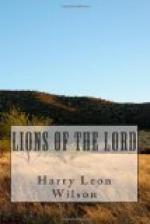And so the campaign went forward. As the winter came on colder, the scouts brought in moving tales of the enemy’s discomfiture. Colonel Alexander of the Federal forces, deciding that the canons could be defended by the Saints, planned to approach Salt Lake City over a roundabout route to the north. He started in heavy snow, cutting a road through the greasewood and sage-brush. Often his men made but three miles a day, and his supply-train was so long that sometimes half of it would be camped for the night before the rear wagons had moved. As there was no cavalry in the force the hosts of Israel harassed them sorely on this march, on one day consecrating eight hundred head of their oxen and driving them to Salt Lake.
Albert Sidney Johnston, commanding the expedition, had also suffered greatly with his forces. The early snows deprived his stock of forage, and the unusual cold froze many oxen and mules.
Lieutenant-Colonel Cooke of the Second Dragoons, with whom travelled the newly appointed governor, was another to suffer. At Fort Laramie so many of his animals had dropped out that numbers of his men were dismounted, and the ambulances used to carry grain. Night after night they huddled at the base of cliffs in the fearful eddies of the snow, and heard above the blast the piteous cries of their famished and freezing stock. Day after day they pushed against the keen blades of the wind, toiling through frozen clouds and stinging ice blasts. The last thirty-five miles to Fort Bridger had required fifteen days, and at one camp on Black’s Fork, which they called the “camp of Death,” five hundred animals perished in a night.
Nor did the hardships of the troops end when they had all reached what was to be their winter quarters. Still a hundred and fifteen miles from the City of the Saints, they were poorly housed against the bitter cold, poorly fed, and insufficiently clothed, for the burning of the trains by the Lord’s hosts had reduced all supplies.
Reports of this distress were duly carried to Brigham and published to the Saints. Their soldiers had made good their resolve to prevent the Federal army from passing the Wasatch Mountains. Aggressive operations ceased for the winter, and the greater part of the militia returned to their homes. A small outpost of fifty men under the command of Major Joel Rae—who had earnestly requested this assignment—was left to guard the narrows of Echo Canon and to keep watch over the enemy during the winter. This officer was now persuaded that the Lord’s hand was with them. For the enemy had been wasted away even by the elements from the time he had crossed the forbidden line.
In Salt Lake City that winter, the same opinion prevailed. They were henceforth to be the free and independent State of Deseret.
“Do you want to know,” asked Brigham, in the tabernacle, “what is to be done with the enemy now on our borders? As soon as they start to come into our settlements, let sleep depart from their eyes until they sleep in death! Men shall be secreted along the route and shall waste them away in the name of the God of Battles. The United States will have to make peace with us. Never again shall we make peace with them.”




